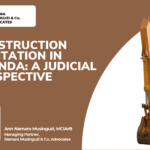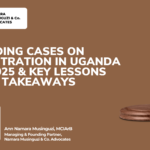Elgonia One Cafe International Limited & 3 Others v Stanbic Bank Uganda Limited & Another, Misc. Appln No. 259/2020 Ruling delivered on October 3, 2024 by Hon. Lady Justice Margaret Apiny
Attention!
A dispute that is not arbitrable as per the terms of the arbitration agreement is still capable of being resolved by arbitration as long as it is so closely interwoven with the arbitrable dispute to be disregarded.
Background to the case
This miscellaneous application was brought under section 34(2)(a)(iv) and (vii) of the Arbitration and Conciliation Act Cap 4 and rule 13 of the Arbitration Rules in which the Applicant sought to set aside the arbitration award.
The main ground on which the application was premised was that the referral to arbitration by the High Court was predicated on an arbitration clause in the field warehousing and storage agreement executed between the 1st Applicant, the 1st and 2nd Respondents only and that the 2nd, 3rd and 4th Applicants were never parties to the agreement. That before the commencement of the arbitration hearing, the 1st Respondent filed an amended Written Statement of Defense and Counterclaim introducing the 4th Applicant to the proceedings. The Applicants’ further contention was that the final order by the Arbitrator against the 2nd, 3rd and 4th Applicants to pay to the 1st Respondent a sum of USD 395,215.53 (United States Dollars Three Hundred Ninety Five Thousand Two Hundred Fifteen, Fifty-Three cents) was premised on the Counterclaim which arose from a mortgage that was never the subject of arbitration referral and subsequent proceedings, and that there was never an agreement to arbitrate under the mortgage transaction and, thus, the Arbitrator lacked jurisdiction to entertain the counterclaim and render the order he rendered.
It was the crux of the 1st Respondent’s case that it amended its defense with the consent of the Applicants, and it introduced a counterclaim and added the 2nd to 4th Applicants. That further, the Applicants filed an amended reply to the Written Statement of Defense and Counterclaim and parties prepared an amended joint scheduling memorandum and agreed on issues by consent. Therefore, it followed that the Applicants, having participated from the start of the proceedings in arbitration, are estopped from asserting that those proceedings were improper. In respect to the 2nd Respondent, the 1st Respondent primarily averred that the Applicants did not lodge any objections to any non-compliance with any provisions of the Arbitration and Conciliation Act and, as such, should be deemed to have waived their right to object.
Ruling of the Court
In dismissing the application, the High Court held inter alia that:
- The parties participated fully in the arbitration and never raised any objections during the proceedings and this amounted to a waiver of the right to object.
- The parties were referred to arbitration by an order of Court that was delivered on 14th February 2020 and none of the Applicants appealed against the said Court Orders.
- That the 4th Applicant, being a sister Applicant to the 1st applicant, is bound by the doctrine of group of companies since they share directors and operate under the same directorships comprised of the 2nd and 3rd applicants and, thus, they were bound by the arbitration clause.
- In as much as there exits party autonomy in arbitration, a party cannot be compelled to participate in an arbitration without their consent and in the case, the 2nd, 3rd and 4th applicants participated in the arbitration without any objection until the arbitration was concluded. They were therefore restrained by section 4 of the Arbitration and Conciliation Act from objecting to an award on a technicality if such a technicality was not raised at the commencement of the arbitration.
In concluding that the applicants’ application lacked sufficient grounds to set aside the arbitration award, the Court relied on section 4 of the Arbitration and Conciliation Act Cap 4 which bars an applicant from objecting to an award on a technicality if such a technicality was not raised at the commencement of the arbitration. The Court held that the applicants having participated in the arbitration and never raised objections during the proceedings, amounted to a waiver of the right to object to the award given at that stage hence they were estopped from challenging the award.
Effect of the Court’s ruling
The Court’s decision underscores the pivotal principle of consent. Active participation in proceedings without raising objections constitutes a waiver of the right to contest the resulting award. The Court effectively reinforced the notion that parties cannot later dispute an award if they have remained silent during the proceedings. This principle of estoppel serves to promote finality of an Arbitral Award which is one of the bedrock principles of Arbitration.
Secondly, the decision reiterates the principle of arbitration without privity which was discussed in depth in the case of Plinth Consultancy Services Ltd v Inyatsi Construction Ltd & 2 others Misc. Cause No. 0053/2024, notably emphasizing the principle of group of companies and beneficial ownership wherein parties that are not privy to an Arbitration Agreement may be held culpable where they are so closely related with the principles to the Arbitration Agreement that the dispute is incapable of being resolved without adding them.
Further, this decision protects the legitimate expectations of all parties involved, ensuring that once an award is issued, it is treated as conclusive. This enhances the credibility of arbitration as a viable alternative to litigation as it instills confidence that awards will not be subjected to indefinite scrutiny. Ultimately, the court’s ruling promotes a balanced and fair approach, urging parties to engage constructively in arbitration and accept the finality of the outcomes they have not contested.
Concluding observations
The court’s ruling leads to several key concluding observations:
- Finality of arbitration: The decision reinforces the principle that arbitration awards are intended to be final and binding. Parties who engage in the process must be diligent in raising any objections during the proceedings, as failure to do so undermines the integrity of the arbitration process.
- Active participation: The ruling emphasizes the importance of active participation. By participating without objection, the applicants implicitly accepted the arbitration proceedings and their outcomes, which fosters a culture of accountability in dispute resolution.
- Waiver of rights: The court highlights that silence or inaction during arbitration can lead to a waiver of rights to challenge the award later. This serves as a cautionary reminder for parties to be proactive in tabling concerns, as their failure to do so may forfeit future claims.
- Promoting efficiency: By affirming estoppel in this context, the ruling promotes efficiency and expediency in arbitration. It discourages unnecessary delays and encourages parties to resolve disputes without the risk of prolonged challenges post-award.
- Encouraging clarity: The decision fosters clarity in the arbitration process. Parties are reminded that they must clearly express any objections during proceedings to ensure that their rights are preserved.
- Legitimacy of arbitration: Lastly, the ruling enhances the legitimacy of arbitration as a preferred method of dispute resolution. By ensuring that awards are respected and upheld, it builds confidence in the arbitration framework among all stakeholders.
In summary, the court’s observations serve to uphold the principles of finality, accountability, and efficiency in arbitration.

Ann Namara Musinguzi; MCIArb
Managing Partner, Namara Musinguzi & Co. Advocates

Higenyi Simon
Legal Trainee, Namara Musinguzi & Co. Advocates
info@namaralaw.com
October 9, 2024



